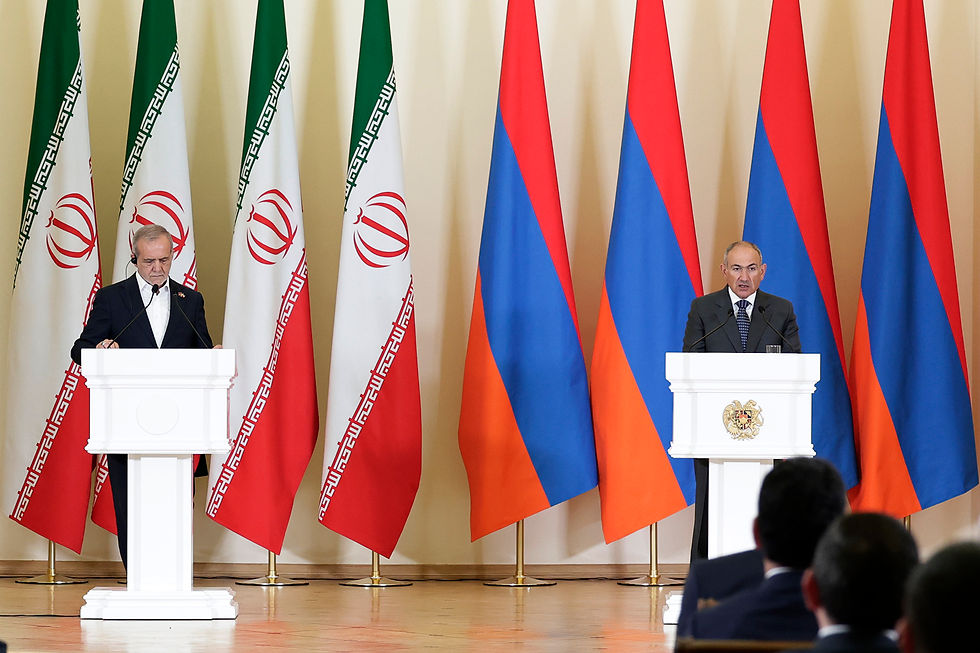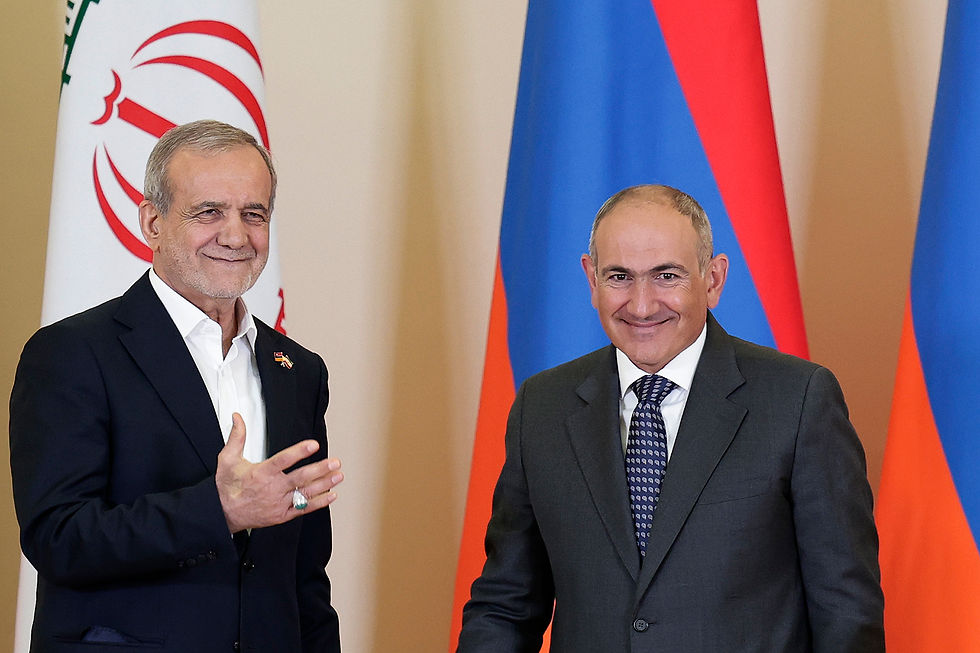Pashinyan Reassures Iran After Washington Peace Deal, but Tehran Warns ‘Outsourcing Problems Only Complicates Situation’
- Aug 19, 2025
- 3 min read

Iranian President Masoud Pezeshkian made his first official visit to Armenia this week, meeting Prime Minister Nikol Pashinyan in Yerevan for high-level talks focused on peace, regional stability, and strengthening bilateral ties. The visit came at a sensitive moment, as Iran remains concerned about the U.S.-brokered negotiations on a transit corridor involving Armenia and Azerbaijan.
Pezeshkian arrived on Monday for a two-day trip and was welcomed with an official ceremony in Yerevan. He first sat down with Pashinyan for a private talk, and then the two leaders met with their full delegations. Their discussions lasted about an hour and a half and ended with the signing of several cooperation agreements.

Armenia and Iran signed more than a dozen documents related to areas such as trade, transport, energy, education, culture, and healthcare. The two sides agreed to increase bilateral trade first to $1 billion and eventually to $3 billion.
Key projects include:
Construction of a second bridge on the Armenian-Iranian border to help with travel and trade.
Completion of the third power transmission line between the two countries, allowing Armenia to expand electricity exports to Iran.
Development of the Persian Gulf–Black Sea transport corridor, linking Iran through Armenia to regional markets.
Cooperation in education, tourism, cinema, healthcare, urban development, and cultural exchanges.

Prime Minister Pashinyan mentioned that these projects are essential to Armenia’s ‘Crossroads of Peace’ plan, which boosts the economy by improving connections with neighboring countries.
Both leaders stressed the need to maintain Armenia’s territorial integrity and emphasized that all communication routes passing through Armenian territory will remain under Armenia’s control.

Pashinyan emphasized after the talks that all transport and communication routes through Armenia will remain fully under Armenian jurisdiction, with security ensured solely by Armenia and no involvement from any third country.
“Peace in the Caucasus is a strategic priority for the Islamic Republic of Iran,” Pezeshkian said. He stressed that while Iran has consistently supported peace talks between Armenia and Azerbaijan, it has one clear condition: “Borders in the South Caucasus must remain unchanged.”

Beyond the official meetings, a critical topic was Armenia’s recent so-called ‘deal’ with Azerbaijan. Signed in Washington earlier this month, the project would give the U.S. long-term control over the transit corridor in the Syunik Province, which is meant to connect Azerbaijan to the Nakhijevan region.
Iran has openly expressed concerns that such an arrangement could weaken its border access to Armenia and bring outside powers into the South Caucasus. Pezeshkian repeated those worries in Yerevan, stressing that “outsourcing problems to powers outside the region only complicates the situation.”

Pashinyan reassured Pezeshkian, saying the corridor would stay under Armenia’s control and wouldn’t involve foreign troops. He added that the ‘deal’ could even help Iran by giving it rail access to Armenia and the Black Sea. But Pezeshkian’s comments implied that Tehran is still worried—understandably so, as many in Armenia worry the corridor doesn’t protect the country’s interests.
The visit shows Armenia’s tricky balancing act: building closer ties with Iran, maintaining relations with the United States, and advancing peace talks with Azerbaijan. Pashinyan described Armenia’s ties with Iran as a ‘strategic partnership,’ pointing to the long history of cooperation between the neighbors

Pezeshkian, in turn, said that with the “political will of both sides, we are determined to strengthen cooperation in all fields.”
The visit is part of ongoing steps to strengthen Armenia-Iran ties. Pezeshkian’s visit reflects Iran’s cautious approach to the recent ‘peace’ deal between Armenia and Azerbaijan, while Pashinyan says that Armenia will maintain authority over its transport routes and continue developing regional partnerships.
—
Support independent reporting from the region by subscribing to The Armenian Report. Our team is funded solely by readers like you.






Comments